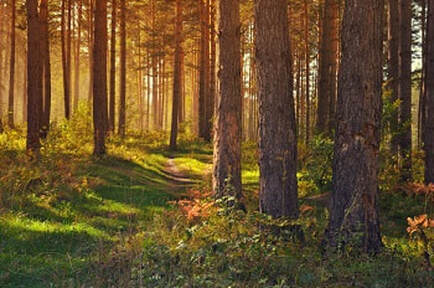Forest
 Forests are everywhere. But where does the word forest come from? There are several suggestions. None are certain.
Forests are everywhere. But where does the word forest come from? There are several suggestions. None are certain.Would you rather go for a walk in the forest or a walk in the woods? Why? The origins of the word forest include words related to foreign, park, and wood (or ‘the woods’) which may help to understand the difference.
The word forest came to English in the late 13th century meaning an extensive tree-covered district, especially one set aside for royal hunting and under protection of the king. The word forest, from Old French forest (forest, wood, woodland), likely comes from Latin forestem silvam (the outside woods).
The word forester came to English in the late 12th century as a surname. In the late 13th century, a forester was the officer in charge of a forest. Forester comes from Old French forestier (forest ranger, forest dweller; also, in early medieval times, forestier meant wild, rough, coarse, unsociable).
So far, this is all that is reasonably known for certain about the origin of the word forest. But let’s continue…
Latin forestem (the outside woods) may have come from either Old High German forst or Latin foris (outside). Latin foris, also the origin of the word foreign, appears to refer to land ‘outside of’ or ‘beyond’ such royal hunting lands. In this sense, a forest was a ‘foreign’ place.
Later, areas which had been designated as ‘forests’ or ‘royal game preserves’ became known as parks (e.g., game parks, from Latin parcus = a main or central fenced woodland). Areas designated for the use of military exercises or storage of military vehicles also became known as parks (hence, a car park or a parking lot). The surname Parker, from the mid-12th century, means a keeper of the park.
In brief, in English, a forest (or park) was a woodland under control or supervision whereas, in Latin, a foris (or forest) was a woodland beyond control or supervision.
Today, the word ‘woods’ tends to refer to relatively familiar places (e.g., wood lots, the back woods) whereas the word forest tends to refer to more unfamiliar places; for example, “Let’s go for a walk in the woods (or the park)” rather than “Let’s go for a hike in the forest.” In terms of canopy cover and density, woods tend to be more open; forests tend to be more enclosed.1
The noun forestry, meaning the privilege of a royal forest, is from the 1690s. Forestry meaning the science of managing forests is from 1859.
The verb ‘to reforest’ (to restore to a wooded condition, replant with forest trees) is from 1831.
Reference: Online Etymological Dictionary, https://www.etymonline.com/
1 I can’t leave the word forest without reference to contemporary forestry research which suggests that a forest is not just a bunch of single trees but, rather, to over-simplify, a forest comprises a series of ‘clumps’ or clusters of trees, each of which emerges from a single integrated underground root and fungal system. In brief, each clump or cluster of trees seems to be one tree; i.e., perhaps a forestree?!
A pioneering researcher in this field is Suzanne Simard, a professor at UBC:
https://www.ted.com/talks/suzanne_simard_how_trees_talk_to_each_other?language=en
Also:
Kimmerer, Robin Wall. (2013). Braiding sweetgrass: Indigenous wisdom, scientific knowledge, and the teachings of plants. Minneapolis: Milkweed, 19 – 20.
Macfarlane, Robert. (2019). Underland. London: Penguin, 88 -91, 103 – 105.
Published on September 15, 2021 11:55
No comments have been added yet.



